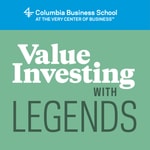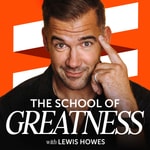Value Investing with Legends – Détails, épisodes et analyse
Détails du podcast
Informations techniques et générales issues du flux RSS du podcast.

Value Investing with Legends
Columbia Business School
Fréquence : 1 épisode/36j. Total Éps: 64

Classements récents
Dernières positions dans les classements Apple Podcasts et Spotify.
Apple Podcasts
🇨🇦 Canada - investing
01/08/2025#83🇨🇦 Canada - investing
31/07/2025#79🇺🇸 États-Unis - investing
31/07/2025#96🇨🇦 Canada - investing
30/07/2025#67🇬🇧 Grande Bretagne - investing
30/07/2025#73🇺🇸 États-Unis - investing
30/07/2025#81🇨🇦 Canada - investing
29/07/2025#93🇺🇸 États-Unis - investing
29/07/2025#70🇨🇦 Canada - investing
28/07/2025#52🇬🇧 Grande Bretagne - investing
28/07/2025#88
Spotify
Aucun classement récent disponible
Liens partagés entre épisodes et podcasts
Liens présents dans les descriptions d'épisodes et autres podcasts les utilisant également.
See allQualité et score du flux RSS
Évaluation technique de la qualité et de la structure du flux RSS.
See allScore global : 73%
Historique des publications
Répartition mensuelle des publications d'épisodes au fil des années.
Phil Ruvinsky - Sustainable Competitive Advantages in Technology
Saison 10 · Épisode 6
vendredi 12 juillet 2024 • Durée 37:23
In this episode, Michael Mauboussin, adjunct professor at Columbia Business School, hosts Phil Ruvinsky, Managing Director and Head of the Fundamental U.S. Growth Team at BlackRock. With extensive experience in the investment industry, Phil shares his journey from law to finance, discusses his investment philosophy, and explains the importance of sustainable competitive advantages. The conversation explores the evaluation of management, the impact of AI on the competitive landscape, and the nuances of portfolio construction. Phil also highlights the role of macroeconomic factors and regulatory changes in investment decisions, shares his thoughts on the future of active management in an increasingly indexed market, and much more!
Key Topics:
-
Introduction to Phil's career and background (1:06)
-
Transition from law to investment and early career challenges (2:15)
-
Importance of business school in shaping investment philosophy (3:47)
-
Recommended books for new team members (4:22)
-
Utilizing competitive strategy analysis in investment decisions (5:50)
-
Unique characteristics of technology, media, and telecom sectors (7:03)
-
Analysis of return on invested capital in different business models (9:10)
-
Approaches to valuation and use of different tools (10:25)
-
Evaluating the importance of management in investment decisions (12:15)
-
Impact of AI and generative AI on the competitive landscape (14:17)
-
Application of AI in the investment process (18:07)
-
Trends in market concentration and their implications (20:26)
-
Effects of indexing and rules-based investing on markets (23:27)
-
Corporate governance, capital allocation, and executive compensation (25:35)
-
Differences between being an analyst and a portfolio manager (28:02)
-
Portfolio construction and risk management (29:38)
-
Considering macroeconomic factors in investment decisions (32:00)
-
Concerns and excitement about the future (34:21)
-
Phil's book recommendations (35:58)
-
And much more!
Mentioned in this Episode:
-
Digital Empires: The Global Battle to Regulate Technology by Anu Bradford
-
Expectations Investing: Reading Stock Prices for Better Returns by Michael Mauboussin
-
Competition Demystified: A Radically Simplified Approach to Business Strategy by Bruce Greenwald
-
The Platform Delusion: Who Wins and Who Loses in the Age of Tech Titans by Jonathan Nee
-
Napoleon Unleashed: A History of the Revolutionary, Emperor, and Military Genius who Reshaped Europe and Defined Modern Leadership by Aeon History
-
Meditations by Marcus Aurelius
-
Thinking in Bets: Making Smarter Decisions When You Don't Have All the Facts by Annie Duke
Thanks for Listening!
Be sure to subscribe on Apple, Google, Spotify, or wherever you get your podcasts. And feel free to drop us a line at valueinvesting@gsb.columbia.edu.
Follow the Heilbrunn Center on social media on Instagram, LinkedIn, and more!
Anu Bradford - EU Influence, Big Tech Challenges, and the Future of Digital Governance
Saison 10 · Épisode 5
vendredi 28 juin 2024 • Durée 01:01:19
In this episode, hosts Tano Santos and Michael Mauboussin speak with Anu Bradford, the Henry L. Moses Professor of Law and International Organization at Columbia Law School, to discuss the intricate dynamics of global technology regulation. Anu is recognized for her deep expertise in international economic law. Her pivotal books "The Brussels Effect" and "Digital Empires" explore how significant regions like the US, EU, and China shape technological standards worldwide. The conversation probes the complexities of regulating big tech companies across different legal and political landscapes, highlighting the significant influence of European regulations on global markets. She also touches on the impact of regulatory practices on innovation, the challenges of enforcing extensive digital laws, and the future trajectory of global tech governance. This episode offers a comprehensive look into the power struggles and cooperative efforts that define international technology regulation and much more!
Key Topics:
- Introduction to Anu Bradford and her background (04:01)
- The unique position of the EU in global regulatory practices and its impacts (10:48)
- Detailed exploration of "The Brussels Effect" and its significance (12:56)
- Global market influence through regulatory strategies (17:02)
- The challenges and methodologies of tech regulation in the EU, US, and China (31:55)
- The role of data security and privacy in international relations and tech regulation (43:06)
- Future challenges and directions in global technology regulation (52:47)
- The preservation of liberal democracy in the digital age (54:51)
- Anu's book recommendations (58:56)
- And much more!
Mentioned in this Episode:
- Digital Empires: The Global Battle to Regulate Technology by Anu Bradford
- The Brussels Effect: How the European Union Rules the World by Anu Bradford
- Chip War: The Quest to Dominate the World's Most Critical Technology by Chris Miller
- Underground Empire: How America Weaponized the World Economy by Henry Farrell and Abraham Newman
- High Wire: How China Regulates Big Tech and Governs Its Economy by Angela Huyue Zhang
Thanks for Listening!
Be sure to subscribe on Apple, Google, Spotify, or wherever you get your podcasts. And feel free to drop us a line at valueinvesting@gsb.columbia.edu.
Follow the Heilbrunn Center on social media on Instagram, LinkedIn, and more!
Sheldon Stone - Liquidity, Covenants, and Capital Availability
Saison 9 · Épisode 2
vendredi 27 octobre 2023 • Durée 01:02:15
Navigating the investment world is an enormous task, especially when looking at company numbers and the people running them. That's why we're thrilled to have Sheldon Stone on the show. Sheldon was the first in his family to go to college, attending the highly respected Bowdoin College. He was part of a remarkable class of 225 students, an experience that shaped his unique perspective on life and career. Hailing from New Jersey, Sheldon Stone has had a fascinating career journey. His time at Bowdoin wasn't just about hitting the books; it also laid the groundwork for his expertise in bonds and financial markets. In today's episode, hosts Michael Mauboussin and Tano Santos sit down with Sheldon to dig into the nuts and bolts of investing. Sheldon shares his path from studying government in college to becoming a seasoned Chief Investment Officer. We dive deep into critical considerations like balancing liquidity and safeguarding investments, understanding the growing high-yield market, and why intangible assets like brands and patents are making financial waves. Sheldon, Michael, and Tano will explore Sheldon's unique educational background, the trade-offs in investment strategies, the rise of the high-yield market, the role intangibles play in today's financial world, and so much more!
Key Topics:
- An overview of Sheldon’s professional background (3:13)
- 40-year partnership with Howard Marks: mutual dynamics and shared intellect (8:38)
- Early high-yield bond market inefficiencies and technological limitations (11:23)
- How equity holders' approach affects creditor relations and company ease-of-work (18:57)
- Company growth via flexibility over ratings and the role of private equity (20:38)
- Operating in 300-550 basis point spreads; equity investment opportunities (24:18)
- Importance of new issues for returns; market appetite and deal quality (26:25)
- Role of equity market signals in bond investments; sector focus (28:34)
- Credit scoring matrix: eight critical factors for buy/sell decisions (31:17)
- Asset recovery rates: tangible vs intangible; market sentiment effects (39:25)
- Impact of rising rates on leveraged loans; stability measures (46:55)
- Challenges with interpreting delinquency rates; sector diversification strategies (50:30)
- Characteristics of influential investment committees: camaraderie and vital CIO (52:04)
- Teaching at Columbia; credit analysis as a career path for students (54:12)
- What keeps Sheldon up at night and excited about the future (57:14)
- Sheldon’s book and theatre recommendations (59:00)
- And much more!
Mentioned in this Episode:
- Charlie Ellis Book | Winning The Loser’s Game
- Howard Marks’ Books
Thanks for Listening!
Be sure to subscribe on Apple, Google, Spotify, or wherever you get your podcasts. And feel free to drop us a line at valueinvesting@gsb.columbia.edu.
Follow the Heilbrunn Center on social media on Instagram, LinkedIn, and more!
Ray Dalio - Risk, Return, and Asset Allocation
Saison 9 · Épisode 1
vendredi 13 octobre 2023 • Durée 59:46
Navigating the complex world of wealth creation and financial history can be daunting. That's why our guest, Ray Dalio, places a strong emphasis on understanding the evolution of wealth, the current economic landscape, and the patterns that govern financial markets.
As an iconic investor and author, Ray offers a wealth of knowledge backed by years of experience in the finance industry. He has written the seminal book, "Principles for Navigating Big Debt Crisis," which serves as a crucial resource for anyone interested in understanding historical financial crises.
Ray is a legendary investor and the founder of Bridgewater Associates, one of the largest hedge funds in the world. He has extensive experience with debt crises, having navigated them multiple times in his career. In addition to his achievements in finance, he is the author of several highly acclaimed books that have garnered him a massive following both inside and outside of the financial community.
In this episode, Ray, Michael, and Tano discuss a range of topics from the evolution of wealth throughout history to the rise of populism in the modern world. They delve into the role of capital markets in wealth creation, the importance of understanding risk-return trade-offs, and much more. Ray also shares his unique perspectives on the challenges faced by countries like China and talks about the importance of deleveraging in today's economic climate.
Join us as we dive deep into these captivating topics with one of the most brilliant minds in the finance industry. Stay tuned for an enriching conversation that promises to offer valuable insights and much more!
Key Topics:
- An overview of Ray’s background (2:56)
- Ray’s early foray into commodities (5:18)
- Shifting from micro to macro via commodities (6:59)
- Founding and pivoting Bridgewater (8:37)
- Alpha and beta separation in investing (11:29)
- Client portfolio customization, beating traditional methods (14:04)
- Decision systemization for diverse returns (16:13)
- Navigating 2008 with debt dynamics knowledge (21:42)
- Transition from assets to future earnings (26:00)
- Market links to economic boom, risks of future promises (31:48)
- Growth's double-edged sword: innovation vs. debt and conflict (33:15)
- US-China war likelihood in the next decade (39:34)
- China's trio of challenges: Debt, demographics, economic model (46:37)
- Advocacy for bipartisan societal reform (54:06)
- Ray’s book recommendations (58:28)
- And much more!
Mentioned in this Episode:
- Bridgewater Associates
- Principles for Navigating Big Debt Crises | Ray Dalio
- Principles for Dealing with the Changing World Order: Why Nations Succeed or Fail | Ray Dalio
- Henry Kissinger’s Books
Thanks for Listening!
Be sure to subscribe on Apple, Google, Spotify, or wherever you get your podcasts. And feel free to drop us a line at valueinvesting@gsb.columbia.edu.
Follow the Heilbrunn Center on social media on Instagram, LinkedIn, and more!
Fireside Chat with Tom Gayner, Markel Corporation
Saison 8 · Épisode 8
vendredi 31 mars 2023 • Durée 39:03
Today’s conversation is a special one. I’m delighted to share my fireside chat with Markel Corporation’s Tom Gayner from our 26th Annual CSIMA Conference. With decades of industry experience, Tom joined us to share insights into how Markel has differentiated itself from others in the insurance industry and the investment approach and philosophies that facilitate its continued growth.
Thomas “Tom” Gayner is the Co-Chief Executive Officer of Markel Corporation. He oversees investing activities for the company, as well as the Markel Ventures’ diverse industrial and service businesses. Tom joined Markel in 1990 to form Markel Gayner Asset Management which provided equity investment counsel for Markel Corporation and outside clients.
In this episode, Tom and I discuss how he went from analyzing Markel to joining the team after its IPO, Markel’s three-engine business model, how Markel Ventures originated, why it’s essential to create an environment that’s supportive of the way you'd like to operate, and so much more!
Key Topics:
-
Tom’s journey to joining Markel (1:28)
-
Markel’s three-engine architecture of insurance, investments, and Markel Ventures (5:00)
-
How AMF Bakery Equipment became Markel Ventures' first investment (9:18)
-
The four lenses for assessing equity investments (13:33)
-
Markel’s nuanced approach to portfolio management (20:44)
-
Learning to improve your investment decision-making process (24:14)
-
Why Tom calls financial statements a donut truth (28:01)
-
Translating the language of GAAP accounting to real economic meaning (29:48)
-
Assessing a company’s debt levels (33:31)
-
How interest rates massively impact human behavior (35:05)
-
And much more!
Mentioned in this Episode:
Thanks for Listening!
Be sure to subscribe on Apple, Google, Spotify, or wherever you get your podcasts. And feel free to drop us a line at valueinvesting@gsb.columbia.edu.
Follow the Heilbrunn Center on social media on Instagram, LinkedIn, and more!
Scott Hendrickson - An Unmasking of Quality
Saison 8 · Épisode 7
vendredi 17 mars 2023 • Durée 52:18
When evaluating a company, getting a clear picture of all the relevant factors can be challenging. That’s why today’s guest, Scott Hendrickson, heavily emphasizes management quality and companies where diligence can provide a high level of conviction.
As a Columbia Business School graduate and adjunct professor, Scott is both a practitioner and a teacher. He has been an integral part of the investing program for almost a decade.
Scott Hendrickson is a Partner and the Co-Founder of Permian Investment Partners, a $1.2 billion management-focused global long/short investment fund. Before co-founding Permian, Scott worked as an Investment Analyst at Brahman Capital. Prior to Brahman, Scott worked as an Associate at Industrial Growth Partners, a middle-market-focused private equity fund. Scott started his career as an Analyst in Merrill Lynch’s Investment Banking Program. Scott graduated from Emory University with a BBA in Finance in 2000 and Columbia Business School with an MBA in 2007. Scott serves on the Columbia Business School adjunct faculty, teaching Applied Value Investing since 2014.
In this episode, Scott, Tano, and I discuss Scott’s journey to a career in investing, why Permian has management as their core focus, the three main business quality metrics they employ, risk management for short interests, characteristics of transformational acquisitions, how teaching has expanded Scott’s perspective, and so much more!
Key Topics:
-
How Scott’s interest in investing evolved from his love for music (1:57)
-
Scott’s learnings from his time at Brahman Capital (5:35)
-
Criteria Permian seeks in longs and shorts (7:01)
-
Why Permian has management as a core focus (8:08)
-
How the quality of Permian’s LPs has become an advantage (10:53)
-
Permian’s approach to screening (12:49)
-
The three main business quality metrics employed (15:38)
-
Permian’s portfolio construction and power rank system (17:20)
-
Breaking down the four short frameworks (22:01)
-
Risk management for short interests (24:46)
-
Factoring in the macro view (26:31)
-
How Permian applies value-added research (30:00)
-
What it means to be “diligence-able” and why that matters (33:38)
-
Characteristics of transformational acquisitions (37:22)
-
Differentiating between structural and fixable costs (39:41)
-
What’s behind the long-term underperformance of European stock markets (42:35)
-
How teaching has expanded Scott’s perspective (44:54)
-
Scott’s recommendations for investors to improve the odds that they will be successful over time (46:26)
-
What keeps Scott up at night and excited about the future (47:23)
-
Scott’s book recommendations (50:16)
-
And much more!
Mentioned in this Episode:
-
Jim Rogers’ Books
Thanks for Listening!
Be sure to subscribe on Apple, Google, Spotify, or wherever you get your podcasts. And feel free to drop us a line at valueinvesting@gsb.columbia.edu.
Follow the Heilbrunn Center on social media on Instagram, LinkedIn, and more!
Bill Nygren - Fundamental Investing From A Generalist’s Perspective
Saison 8 · Épisode 6
vendredi 3 mars 2023 • Durée 01:05:06
With the constant evolution of the asset management industry, investors need to stay a step ahead to justify earning an active management fee. With over 40 years of experience in the industry, this is a lesson that today’s guest, Bill Nygren of Harris Associates, instills in the younger analysts he mentors.
Bill is a true legend of value investing and an investor you can turn to whenever the market is uncertain. He radiates fundamental ideas and has an expansive perspective on the comings and goings of the market and the economy at large.
Bill is the Chief Investment Officer for US equities at Harris Associates, which he joined in 1983, and a vice president of the Oakmark Funds. He has been a manager of the Oakmark Select Fund since 1996, Oakmark Fund since 2000, and the Oakmark Global Select Fund since 2006. Bill served as the firm’s director of research from 1990 to 1998. He has received many accolades during his investment career, including being named Morningstar’s Domestic Stock Manager of the Year for 2001, and he holds an M.S. in Finance from the University of Wisconsin’s Applied Security Analysis Program (1981) and a B.S. in accounting from the University of Minnesota (1980).
In this episode, Bill, Michael, and I discuss why Bill was drawn to value investing, why generalist analysts transition more easily to portfolio manager than specialists, his approach to idea generation and portfolio construction, pivoting in times of crisis and great distress, recession insights from over 40 years of experience, and so much more!
Key Topics:
- Welcome Bill to the show (1:09)
- Bill’s lifelong fascination with the line between gambling and investing (2:17)
- Why Bill was drawn to value investing (4:51)
- The importance of working at a firm that shares your investment philosophy (6:26)
- Why generalist analysts transition more easily to portfolio manager than industry specialists (9:36)
- Dealing with industry intricacies as a generalist analyst (14:05)
- Harris Associates’ approach to idea generation (15:55)
- What it’s like to be an analyst at Harris Associates (18:31)
- Why Harris uses multiple techniques to define value (24:25)
- Looking at management’s attitude towards capital redeployment (26:33)
- Harris’ maintenance process and error recognition methods (30:08)
- Bill’s thoughts on the news of Microsoft’s massive investment into OpenAI(32:53)
- Pivoting in times of crisis and great distress (36:38)
- Capital One as a case study of a stock that represents a good investment opportunity today (41:25)
- Recession insights from over 40 years of industry experience (44:02)
- Thinking about the effect of the current interest rate environment (48:35)
- Criteria for portfolio construction and position sizing (49:52)
- The evolving opportunity set (53:21)
- Identifying anomalies in GAAP accounting (55:44)
- The things that keep Bill up at night and excited about the future (59:31)
- Bill’s book recommendations (1:02:04)
- And much more!
Mentioned in this Episode:
- Harris Associates
- Oakmark Funds
- Michael Dell’s Book | Play Nice But Win: A CEO's Journey from Founder to Leader
- John Mack’s Book | Up Close and All In: Life Lessons from a Wall Street Warrior
- Joe Maddon & Tom Verducci’s Book | The Book of Joe: Trying Not to Suck at Baseball and Life
Thanks for Listening!
Be sure to subscribe on Apple, Google, Spotify, or wherever you get your podcasts. And feel free to drop us a line at valueinvesting@gsb.columbia.edu.
Follow the Heilbrunn Center on social media on Instagram, LinkedIn, and more!
Angela Aldrich - Developing A Differentiated View
Saison 8 · Épisode 5
vendredi 17 février 2023 • Durée 01:05:27
One of the most exciting things in our industry is finding young investment managers who are incredibly bright, hard-working, and well-trained in the investment process. Our guest today, Angela Aldrich, fits that bill perfectly.
Angela is the co-founder of Bayberry Capital Partners, a hedge fund with a half-billion dollars in assets based in New York. Before starting Bayberry Capital Partners, she worked at John Griffin’s Blue Ridge Capital, which shut down in 2017 after a glorious 21-year run during which it returned its investors an average return of 15.3% annually. Angela graduated from Duke University with a degree in economics and received an MBA from Stanford University Graduate School of Business. Before joining Blue Ridge, Angela worked at Goldman Sachs, BDT Capital Partners, and Scout Capital Management.
In this episode, Angelo, Tano, and I discuss her path to a career in investing, what it was like to be mentored by John Griffin, Angela’s key learnings from her transition from analyst to portfolio manager, Bayberry’s investment philosophy and approach to search, portfolio construction and sizing, how to find opportunities in volatility, case studies of companies which demonstrate Bayberry’s organizational principles in action, and so much more!
This podcast is not an offer to sell or the solicitation of an offer to purchase any securities, nor is it an offer of any advisory services. This podcast is for informational and educational purposes only, and intended to provide general market commentary. The discussion of any individual investments discussed in this podcast is for informational purposes only, and any such investments are not representative of all of the investments held, or that may in the future be held, by any fund, account or investment vehicle managed by Bayberry Capital Partners LP. Nothing in this podcast, including any discussion of past results, is a guarantee of similar or future outcomes.
Key Topics:
- Welcome Angela to the show (2:12)
- How Angela found her way to a career in investing (3:09)
- The transformational experience of working with John Griffin, founder of Blue Ridge Capital Management (5:53)
- Navigating the transition from analyst to portfolio manager (9:13)
- Portfolio construction as a form of risk management (11:20)
- Finding opportunities in periods of crisis and high volatility (15:00)
- The investment philosophy and organizational principles that drive results at Bayberry Capital (18:25)
- Bayberry’s approach to recognizing surprisingly high business quality (22:04)
- Signposts of suitable candidates for the short side (25:39)
- Unlocking value from an investment thesis (27:22)
- How to avoid thesis creep (30:26)
- The central importance of identifying the right key investment factors (33:23)
- Portfolio sizing principles at Bayberry (36:21)
- Why WillScot Mobile Mini Holdings became Bayberry’s largest long (39:36)
- How Bayberry goes about valuing businesses (48:27)
- Why Bayberry became interested in Burford Capital (50:38)
- What keeps Angela worried and excited about markets in the future (1:01:14)
- Angela’s book recommendations (1:02:32)
- And much more!
Mentioned in this Episode:
- Carol S. Dweck’s Book | Mindset: The New Psychology of Success
- Sudhir Venkatesh’s Book | Gang Leader for a Day: A Rogue Sociologist Takes to the Streets
Thanks for Listening!
Be sure to subscribe on Apple, Google, Spotify, or wherever you get your podcasts. And feel free to drop us a line at valueinvesting@gsb.columbia.edu.
Follow the Heilbrunn Center on social media on Instagram, LinkedIn, and more!
Charley Ellis - The Evolution of the Asset Management Industry
Saison 8 · Épisode 4
vendredi 3 février 2023 • Durée 01:15:38
Over the past several decades, asset management has transformed from a small industry with a few experts competing against a majority of amateurs in the market to a market saturated with well-equipped and highly resourced experts competing against each other.
When I think about my pantheon of all-time great investment thinkers and writers, our guest today stands out as one of the industry's legends. Charley Ellis has played the most significant role in how I think about the investment industry, and I can’t think of anyone better to talk about the industry's evolution.
Dr. Charles D. Ellis is the founder and former managing partner of Greenwich Associates, an international consultancy where he advised large institutional investors, foundations, and government organizations in more than 130 financial markets across the globe. Through that lens, he has been a keen observer of what works in organizations and markets for the last half-century. For nine years, Charley was chair of the Investment Committee at Yale, his alma mater, where he worked closely with its legendary Chief Investment Officer, David Swensen. He also served as a director of the Vanguard Group from 2001 to 2009. Charlie is a Harvard Business School graduate and has taught advanced investing courses at both Yale and Harvard. The CFA Institute recognized him as one of the twelve leading contributors to the investment profession, and along the way, Charlie has published nineteen books.
In this episode, Tano, Charley, and I discuss what inspired him to found Greenwich Associates, what goes into identifying the right questions to ask, how the industry has shifted from a winner’s game to a loser’s game, the massive changes in the asset management industry since the founding of Greenwich Associates, lessons from the Yale endowment model, Charley’s book recommendations, and so much more!
Key Topics:
- Welcome Charley to the show (1:13)
- How Charley’s early experience at Donaldson, Lufkin & Jenrette inspired the concept for Greenwich Associates (3:07)
- Structuring research and gathering the right kinds of questions (7:51)
- How Charley developed a passion for sharing insights with the public at large (10:00)
- The dual roles of academia and the industry itself in the evolution of the asset management industry (11:46)
- Simon Ramo and The Loser’s Game (13:33)
- Massive changes in the asset management industry since Charley founded Greenwich Associates (19:07)
- Why it was much easier for active managers to beat the market in the early days of the industry (25:03)
- Understanding the relentless pace of competition (29:35)
- The importance of actively determining the right investment strategy for you (32:44)
- Charley’s perspective on the legacy of Vanguard’s Jack Bogle (37:26)
- Why Charley cites John Neff as the best active manager of his time (43:27)
- David Swenson’s capacity for innovative thinking (46:51)
- Lessons from the Yale endowment model (51:02)
- Highlights from Charley’s book, Capital (58:38)
- Essential elements of creating and perpetuating a great culture (1:00:06)
- Why the willingness to address problems head-on is crucial in sustaining excellence (1:02:30)
- Charlie’s excitement about our education system (1:06:19)
- Which overlooked issue does Charlie wish garnered more attention? (1:07:07)
- Charley’s book recommendations (1:12:09)
- And much more!
Mentioned in this Episode:
- Charley Ellis’ Books
- Figuring It Out: Sixty Years of Answering Investors' Most Important Questions
- Inside Vanguard: Leadership Secrets From the Company That Continues to Rewrite the Rules of the Investing Business
- Winning the Loser's Game: Timeless Strategies for Successful Investing
- Capital: The Story of Long-Term Investment Excellence
- What It Takes: Seven Secrets of Success from the World's Greatest Professional Firms
- Charley Ellis’ Articles
- Burton G. Malkiel’s Book | A Random Walk Down Wall Street: The Best Investment Guide That Money Can Buy
- Neil deGrasse Tyson’s Book | Astrophysics for People in a Hurry
Thanks for Listening!
Be sure to subscribe on Apple, Google, Spotify, or wherever you get your podcasts. And feel free to drop us a line at valueinvesting@gsb.columbia.edu.
Follow the Heilbrunn Center on social media on Instagram, LinkedIn, and more!
Felix Oberholzer-Gee - The Competitive Advantage of Value-Based Strategy
Saison 8 · Épisode 3
vendredi 20 janvier 2023 • Durée 01:10:46
Success comes from value creation.
For a strategic initiative to create value, it must increase willingness to pay or decrease willingness to sell. Otherwise, the resources expended will not flow into profitability.
Today’s discussion is one I was looking forward to because we’re focusing on value-based strategy frameworks and using strategic analysis to understand whether a company has a competitive advantage. Joining us to explore this topic is someone who has taken a fundamentally sound framework and brought it to life with excellent insights and vivid examples, Felix Oberholzer-Gee.
Felix Oberholzer-Gee is the Andreas Andresen Professor of Business Administration in the Strategy Unit at Harvard Business School. A member of the faculty since 2003, Felix has won numerous awards for excellence in teaching, including the Harvard Business School Class of 2006 Faculty Teaching Award for best teacher in the core curriculum and the 2002 Helen Kardon Moss Anvil Award for best teacher in the Wharton MBA program. He teaches competitive strategy in executive education programs such as the Program for Leadership Development, the Senior Executive Program for China, and a program for media executives titled Effective Strategies for Media Companies. His course, Strategies Beyond the Market, is a popular elective class for second-year MBA students. Felix is the author of numerous books, and his latest book, Better, Simpler Strategy, will be a major subject of today’s conversation.
In this episode, Felix, Tano, and I discuss how Felix defines his strategy framework, why willingness to pay and willingness to sell should be at the core of every strategy conversation, the value of ROIC as a metric of success, how Felix thinks about driving competitive advantages, value capture versus value creation, how to think about complements and substitutes, the potential for innovation and productivity growth, and so much more!
Key Topics:
- Welcome Felix to the show (2:03)
- Why a Ph.D. for career advancement unexpectedly led to Felix’s transition into academia (2:24)
- How case writing guides Felix’s interests and research focus (4:20)
- Defining a value-based strategy framework (6:25)
- Why should every conversation start with “Are we increasing willingness to pay or are we decreasing willingness to sell?” (10:08)
- Why Felix chose return on invested capital (ROIC) as a primary metric (12:40)
- Looking at ROIC distribution over the long term (14:22)
- Focusing on creating a competitive advantage inside of your industry segment (18:25)
- The significant issues strategists have with P&L statements (21:31)
- Value capture versus value creation (24:56)
- Determining willingness to pay (28:21)
- Harnessing network effects to increase willingness to pay (29:19)
- When to be worried about new entrants (33:18)
- Types of relationships between complementors (36:59)
- Understanding complements and value creation (40:26)
- Identifying complements and subtitutes (43:27)
- The effect of different management practices on productivity and willingness to sell (50:53)
- Tying willingness to pay and willingness to sell to strategy maps (56:01)
- Case study: Best Buy (58:09)
- The potential for innovation and productivity growth (1:02:09)
- Why Felix is obsessed with the differences between how we think about products and services versus jobs (1:04:50)
- Felix’s book recommendations (1:08:18)
- And much more!
Mentioned in this Episode:
- Felix Oberholzer-Gee’s Book | Better, Simpler Strategy: A Value-Based Guide to Exceptional Performance
- Youngme Moon’s Book | Different: Escaping the Competitive Herd
- Frances Frei & Anne Morriss’ Book | Uncommon Service: How to Win by Putting Customers at the Core of Your Business
Thanks for Listening!
Be sure to subscribe on Apple, Google, Spotify, or wherever you get your podcasts. And feel free to drop us a line at valueinvesting@gsb.columbia.edu.
Follow the Heilbrunn Center on social media on Instagram, LinkedIn, and more!









